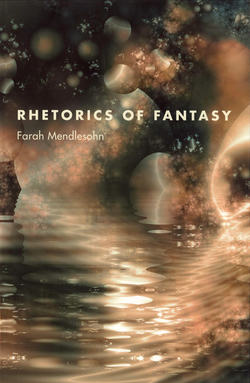Читать книгу Rhetorics of Fantasy - Farah Mendlesohn - Страница 25
На сайте Литреса книга снята с продажи.
ОглавлениеChapter 2
The Immersive Fantasy
The immersive fantasy is a fantasy set in a world built so that it functions on all levels as a complete world. In order to do this, the world must act as if it is impervious to external influence; this immunity is most essential in its relationship with the reader. The immersive fantasy must take no quarter: it must assume that the reader is as much a part of the world as are those being read about. It should construct an irony of mimesis in which ornamental speech and persuasive speech become inseparable (Frye, Anatomy of Criticism 245). The immersive fantasy is both the mirror of mimetic literature and its inner soul. It reveals what is frequently hidden: that all literature builds worlds, but some genres are more honest about it than others. Mimetic literature, that fabulous conjuration of “the real,” is the product of a cumulative “bible.”1
Mimesis is the art of persuading the reader to forget the mediation of language. Irony of mimesis does not necessarily mean that we are assumed to be in the world (although this is one technique), but that we must share the assumptions of the world as much as a contemporary reader of Jane Austen shared the assumptions she presented in Pride and Prejudice.2 If we imagine different levels of “reality” as concentric shells around the world, then the reader of the immersive fantasy must be able to sit between the shell that surrounds the narrative and the shell that protects the world as it is built from any suggestion that it is not real—a position Gary Westfahl has termed double estrangement (237). In effect, we must sit in the heads of the protagonists, accepting what they know as the world, interpreting it through what they notice, and through what they do not. In this form of fantasy, the positioning of the omniscient narrator (should one exist), is crucial. The immersive fantasy must partake of Irwin’s “quiet assertion”: “There are no authorial exclamations about how astonishing all this is … [and characters express] straightforward observations, expressing interest rather than amazement” (69). Peter Nicholls, discussing science fiction, describes this strategy as seeking to “domesticate [the world] … rather than draw attention to its absolute oddity” (32).
If the above seems prescriptive, let us pause for a moment to consider two fantasies that strive for immersion, but that in their rhetoric make both the protagonists and the readers strange in the land. In the first, Golden Armour: The Helmet (Scholastic, 2000) by Richard P. Brown, the children have lived in the castle all their lives and have lived with themselves all their lives, but the insistent narration rehearses who and what they are: “When she was a small child, Cassie had discovered that she could heal little creatures that seemed sick” (12), while “Keiron had a gift too—not such a powerful one, but inexplicable nevertheless. From an early age he had learned that he could ‘speak’ to things in his head, they all had a voice in his head and would answer his questions if they had a mind to” (13). The second example to consider is G. P. Taylor’s Shadowmancer (2003), a tale in which two children in a northern village strive to defeat the wicked sorcerer-vicar Obadiah Demurral. Again, we have the description of things a child knows about himself: “Thomas Barrick was thirteen years old. He had lived all his life in Thorpe and had never been any further than Whitby. His father had been lost at sea in a great storm when Thomas was seven years old” (17–18). His friend Kate, “always said that she feared nothing. She didn’t believe in ghosts, creatures of the night, or God himself. Her father had beaten all the belief from her. To her father she had to be the nearest thing to a son. The son who had died two years before she was born” (39). The list of information—much of it irrelevant and with no impact on the actual novel—processes like a social worker’s report across the pages. It is of course a classic example of telling, rather than showing, and as such could simply be dismissed as poor style. But the ability of the writer to show rather than tell depends in part on the assumption of a consensus reality. These writers have made no such assumptions, even though Taylor is writing a deliberately Christian fantasy, and therefore might assume common knowledge. The result in both is to break the consensus reality, to position the readers as ignorant as they might be in a quest fantasy. In a world they are supposed to know, the result is discordant.
